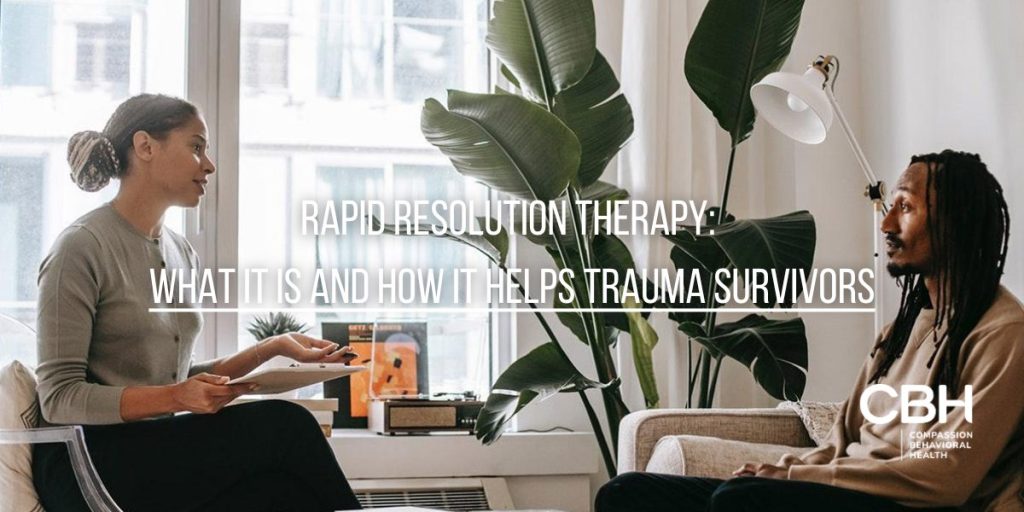Rapid resolution therapy (RRT) is a form of psychotherapy designed to help individuals overcome the ongoing effects associated with traumatic experiences. RRT uses guided imagery, hypnosis, stories and other types of communication to resolve troubling thoughts, emotions and behaviors. Compassion Behavioral Health offers rapid resolution therapy to treat trauma, anxiety, PTSD and other mental health disorders in our clients.
If you are interested in learning more about this therapy and how it can help you or a loved one process traumatic experiences, contact Compassion Behavioral Health today. In the meantime, here’s more information about this innovative approach to healing past trauma.
A New Approach to Treating Traumatic Experiences
Traumatic events have long-lasting effects on survivors. Life after a traumatic event is different, as survivors see things through an entirely different lens. And there is no way to expedite the healing process. It takes time to heal from trauma and everyone moves at their own pace.
However, when trauma isn’t processed, it can turn into post-traumatic stress disorder, a longer term condition that involves recurring flashbacks and re-experiences. These flashbacks can feel so real, the person experiences strong physical and emotional reactions. To avoid feeling this way, individuals go to great lengths to avoid contact with potential triggers, causing a great level of distress in their lives.
There are a number of treatments available to help people with PTSD, including cognitive processing therapy, prolonged exposure therapy, and eye movement desensitization and reprocessing (EMDR). While these therapies can be effective, they also force the person to relive their traumatic experiences. Rapid resolution therapy is different.
What is Rapid Resolution Therapy? How Does it Work?
Rapid resolution therapy is a newer form of therapy developed by Dr. Jon Connolly with the goal of helping trauma survivors identify their trauma and the root cause of their feelings and symptoms. It was originally designed for combat veterans and women who suffered sexual abuse, but it has been shown to be effective at treating other types of problematic behavior like anxiety, anxiety, and panic attacks.
When something traumatic happens, we go over it again and again in our minds. The neural messages keep going down the same pathway with the same emotional response. This is why we experience the same feelings and emotions as if they were happening all over again.
With RRT, you and the therapist use storytelling, guided imagery, and creativity to build a new neural pathway that does not include the emotional reaction that used to accompany the traumatic thought. In a sense, you’re hitting the “reset” button on the brain. As a result, the emotional pain and reactions are no longer present and you’re no longer triggered by similar thoughts, smells, or sensations.
While this may sound difficult, it’s really very simple. This “update” to your brain benefits the mind and allows you to experience peace, calm, and healing. Additionally, RRT is a brief therapy that usually only takes two to six sessions to complete.
Benefits of RRT Therapy
Physical Benefits of RRT Therapy
While RRT Therapy primarily focuses on resolving emotional and psychological challenges, it often brings about notable physical benefits as well. As clients release emotional distress, they may experience a reduction in stress-related symptoms, such as headaches, muscle tension, and fatigue.
RRT Therapy works holistically, recognizing the interconnectedness of the mind and body. By addressing emotional trauma, RRT supports the body’s natural healing processes and promotes overall well-being.
Emotional and Psychological Benefits of RRT Therapy
One of the defining characteristics of RRT Therapy is its ability to bring about rapid and lasting emotional and psychological relief. Clients often report significant reductions in anxiety, depression, fear, and other negative emotions after just a few sessions.
Through the resolution of traumatic memories, RRT Therapy provides individuals with a renewed sense of inner peace, empowerment, and self-worth. This positive transformation has a ripple effect on various aspects of their lives, including relationships, work, and overall life satisfaction.
Who Can Benefit from RRT Therapy?
RRT Therapy for Trauma Survivors
Individuals who have experienced trauma, whether from childhood abuse, accidents, natural disasters, or other distressing events, can benefit greatly from RRT Therapy. By directly addressing the root causes and symptoms of trauma, RRT helps survivors heal, regain control, and reclaim their lives.
Professionals in High-Stress Environments
Professionals in high-stress fields, such as healthcare, law enforcement, or corporate environments, may find RRT particularly beneficial. The therapy can help individuals manage stress, improve resilience, and prevent burnout.
RRT Therapy for Anxiety and Stress Management
Anxiety and stress are prevalent in today’s fast-paced world, and RRT Therapy offers effective tools for managing these challenges. By reprocessing the underlying beliefs and emotions that contribute to anxiety and stress, RRT empowers individuals to develop healthier coping mechanisms and live more fulfilling lives.
Individuals Seeking Personal Growth
RRT is ideal for those looking to enhance their emotional well-being and personal development. Whether facing specific challenges or seeking overall improvement, RRT can provide valuable insights and tools for growth.
Challenges and Considerations in Rapid Resolution Therapy
Not a One-Size-Fits-All Solution
While RRT can be highly effective, it may not be suitable for everyone. Some individuals may require more traditional therapeutic approaches or longer-term support. It’s essential to recognize that each person’s journey is unique, and what works for one may not work for another.
Potential Emotional Discomfort
Engaging in therapy, especially when addressing trauma, can sometimes lead to emotional discomfort. Clients may experience feelings of sadness, anger, or anxiety as they confront difficult experiences. However, skilled RRT practitioners are trained to guide clients through these emotions safely and constructively.
Commitment to the Process
For RRT to be effective, clients must be committed to the therapeutic process. This includes being open to exploring emotions, participating actively in sessions, and practicing techniques outside of therapy. The more engaged a client is, the more likely they are to achieve positive outcomes.
The RRT Therapy Process
What to Expect in an RRT Therapy Session
RRT Therapy sessions typically begin with an initial assessment, where the therapist gathers information about the client’s history and goals. During subsequent sessions, the therapist guides the client through a series of techniques designed to access and resolve underlying emotional issues.
The RRT Therapy process is collaborative, with the therapist and client working together to identify and reprocess traumatic memories or negative beliefs. Each session is tailored to the individual’s unique needs, ensuring a personalized and effective treatment experience.
The Role of the Therapist in RRT Therapy
The therapist plays a crucial role in the RRT Therapy process, providing a safe and supportive environment for clients to explore their emotions and experiences. They bring expertise in guiding clients through the reprocessing techniques and facilitating transformative change.
A skilled RRT therapist establishes a strong therapeutic alliance with their clients, creating a foundation of trust and rapport. Through their guidance and expertise, they empower clients to access their innate healing resources and achieve lasting resolution.
Whether facing trauma, anxiety, or simply seeking personal growth, RRT provides valuable tools for healing and self-discovery. As with any therapeutic approach, finding the right practitioner and being committed to the process are vital components of success. Embracing RRT may lead to a transformative experience, unlocking the potential for a happier, healthier life.
Rapid Resolution Therapy in Florida
If you’re ready to take the next step towards healing and personal growth with Rapid Resolution Therapy, Compassion Behavioral Health is here to guide you. Our specialized team at our mental health treatment facilities in South Florida is committed to providing you with a customized treatment plan that addresses your unique needs, ensuring a sustainable recovery. Don’t wait to reclaim your life. Call Us Today and let us be the ray of hope you’ve been searching for on your journey to a happier, healthier you.



